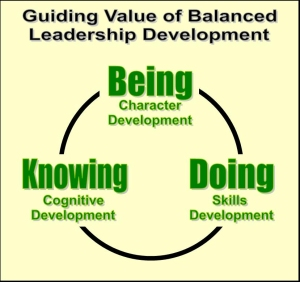Corporate and Legal Resources
The Value of Balanced Leadership Development
A Christian leader’s fruitfulness in ministry is the byproduct of responding in faith to the call of God on his or her life. With such an understanding, this system is designed as a guidebook of activities to be followed by a leader-in-training and his or her mentor. This manual provides an explanation of key developmental values and exercises, as well as suggestions for further reading and study, to be worked through and reviewed with the mentor.
In the developmental process of equipping effective leadership for the  Church, a balanced approach to growth is important. In fact, to concentrate too heavily on study alone (Knowing) and neglect character growth (Being) produces the potential for a leader with head knowledge alone and weak character. Likewise, to focus exclusively on skills development (Doing), without disciplined study and learning to think deeply (Knowing), can produce an ineffective leader who is busy doing ministry without sound wisdom and understanding to teach and lead others. Therefore, the mentor and mentoree should be working together simultaneously on growth areas that deal with character (Being), ministry skills (Doing), and the mind or cognitive development (Knowing). This “Being – Doing – Knowing” approach to leadership development is foundational to the methodology of Growing Christian Leaders.
Church, a balanced approach to growth is important. In fact, to concentrate too heavily on study alone (Knowing) and neglect character growth (Being) produces the potential for a leader with head knowledge alone and weak character. Likewise, to focus exclusively on skills development (Doing), without disciplined study and learning to think deeply (Knowing), can produce an ineffective leader who is busy doing ministry without sound wisdom and understanding to teach and lead others. Therefore, the mentor and mentoree should be working together simultaneously on growth areas that deal with character (Being), ministry skills (Doing), and the mind or cognitive development (Knowing). This “Being – Doing – Knowing” approach to leadership development is foundational to the methodology of Growing Christian Leaders.
The mentor will evaluate and determine the development exercises and activities which will be most helpful for the leader in training. The program includes various activities divided sections designed to provide a path for development, yet provide the flexibility to allow the learner to focus on particular areas of growth. Developmental Exercises are segmented into Units in Section 3. Completion of these units will take 12 to 18 months, or whatever timeframe is deemed appropriate by this partnership in spiritual leadership development.
Journaling is a key element in this system. As each of the development steps are reported in a journal entry the work of the Lord in the developing leader’s life will also be recorded. The mentor will review the mentoree’s experiences and share lessons learned in his or her own life and ministry experience. If you are keeping a separate journal, it will be helpful to record the journal entry date next to the corresponding exercises in this guide so that the journaling can be easily located for future reference.
In addition to the exercises and opportunities for personal reflection, there is an Evaluation of Spiritual Experiences and Understanding. After several mentor meetings, this evaluation may be used to gauge how far the mentoree has progressed in his or her development as a Christian leader. This section should be visited, revisited and updated periodically to evaluate progress during the ongoing training process.
It is also understood that any Christian Leader must be a student of the Bible, God’s Holy Word. The studies and cognitive learning that takes place in this system are intended to augment and galvanize the teachings of the Word of God.
Mentoring is Discipling:
Mentoring is a modern word for shepherding or discipling. The English definition of disciple, according to Webster’s Dictionary, is “a person who believes in and helps disseminate the teaching of a master.” Vines Expository Dictionary of Biblical Words says that a disciple is a “learner,” from the Greek “mathesis”, indicating thought accompanied by endeavor. It means one who actively follows a teacher. A disciple is not only a pupil, but also an adherent, or an imitator of the teacher.
As Christians we are disciples of Jesus Christ. In John 8:31-32, Jesus says, “If you hold to my teaching, you are really my disciples. Then you will know the truth, and the truth will set you free.” Jesus also said, “This is to my Father’s glory, that you bear much fruit, showing yourselves to be my disciples.” (John 15:8)
The Gospels use the Greek word “akoloutheo” which means, “one going in the same way.” This word appears 77 times in the New Testament to describe discipleship. If we are disciples of Jesus Christ, we are imitators or followers of Him.
In the mentoring relationship, it is critical that the mentor be a model for the mentoree. Following the example of Christ, the mentor will share in the experience of Being – Doing – Knowing with the leader in training. Since a disciple is an imitator, the process of Growing Christian Leaders must be a shared experience.
